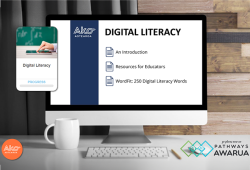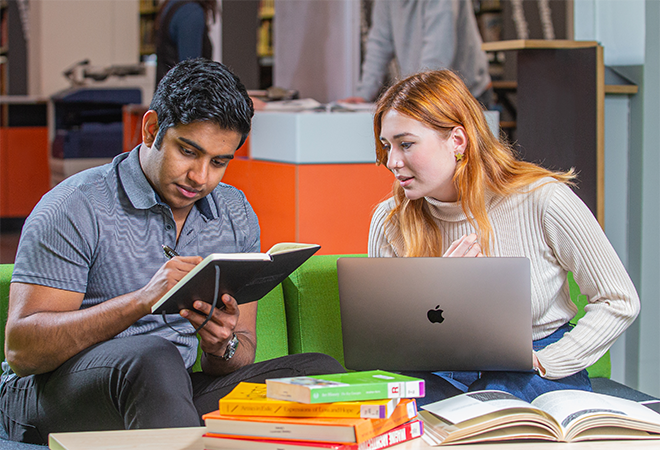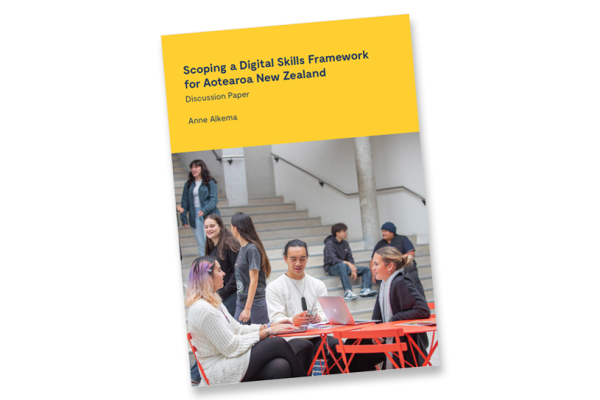What is Digital Literacy?
Digital skills are now considered essential to fully participate in modern society.
We live in a rapidly changing world where technology shapes how we work, communicate, shop, learn, and connect with each other. For both educators and learners, digital literacy is no longer optional — it is foundational to participation, wellbeing, and success in education and beyond.
This page curates research, tools, and free professional development resources to support digital capability across Aotearoa’s tertiary education sector — including PTEs, ITPs, universities, and foundation learning contexts.
What is Digital Literacy?
Digital literacy is the ability to find, evaluate, create and communicate information using digital media and technology platforms.
This includes:
- Hardware or device skills – e.g. using computers, smartphones, ATMs or ticketing machines.
- Software skills – e.g. navigating operating systems, apps, websites, search engines, and social media.
- Language and symbol fluency – understanding the meanings of digital terms, tech vocab, emojis, and memes across various digital environments.
In the 2023 PIAAC Survey of Adult Skills (New Zealand), 29% of adults scored at or below Level 1 in adaptive problem-solving skills — a category that includes essential digital capabilities. This suggests nearly one-third of adults in Aotearoa may face challenges using digital tools to navigate daily life and learning.
Supporting learners’ digital literacy is key to fostering digital inclusion and equity, as well as building critical and creative thinking skills for a digital future.
How to find, evaluate, use and create digital content | Information about using digital media on the National Library of New Zealand website. Read more on the National Library website
Explore Resources and Pathways
 Digital Literacy Educator Pathway (via Pathways Awarua)
Digital Literacy Educator Pathway (via Pathways Awarua)
A free, self-directed online course for educators to grow their digital capability and support learners in developing theirs.
The Digital Literacy Educator Pathway currently features four collections:
- Collection 1 looks at what digital literacy is, presents a range of digital literacy frameworks, and explores the interplay of digital literacy and remixing.
- Collection 2 has a wealth of resources, strategies, icebreakers, and activities for teaching digital literacy.
- Collection 3 helps you familiarise yourself with 250 specialised words for digital literacy.
- Collection 4 is about cyber security and covers key areas to help educators securely navigate the digital world.
Visit Pathways Awarua to start the Educator Pathway
Free Online Course – Digital Skills Level 1 (Digital Passport)
This free course introduces the basics of computers and using the internet. You’ll learn about how to stay safe online, social media platforms, image and video editing tools, virtual reality and more.
Visit the Digital Passport website
Free Online Courses – Centre for Open Education Practice (COEP)
Explore the Learning in a Digital Age micro-courses developed by OERu. These open courses support educators and learners alike to grow their digital skills flexibly and at no cost.
Digital Literacy WordFit
A playful, practical resource on Pathways Awarua designed to build familiarity with key digital technology terms and ideas. Great as an activity for learners or professional development starter.
Resources for Tertiary Educators
How to find, evaluate, use and create digital content
Information about using digital media on the National Library of New Zealand website. | Read more on the National Library website
Digital Skills Framework (2023)
A discussion paper scoping current digital skills development in Aotearoa, with international insights. | Read the framework
Online Orientation to Open, Flexible and Distance Learning (OFDL)
A resource hub for learners, educators, and managers to build confidence in online and blended learning. | Explore OFDL
ePosts (2017)
A practical guide for tertiary educators new to online learning, covering methodologies, pedagogy and tools. This guide is free to download and adapt to your needs. | Read the ePosts resource
Art at Risk copyright, fair dealing and art in a digital age – Teacher’s Resource (2011)
Art at risk provides a set of research resources and practical information for teachers working with digital images. | Read the Art at Risk reports
Digital Inclusion, Equity, and Accessibility
Creating inclusive and accessible digital experiences is critical. Everyone — including disabled learners and users of assistive tech — should be able to access digital education and public services.
Key guidance:
NZ Government Web Accessibility Standards | Practical advice for anyone developing or delivering digital content. Visit the accessibility standards guide
Kōrero for Change | Webinar series by Access Matters Aotearoa highlighting digital equity and inclusive technology practices in education. Watch the webinar
Consider how your learning environment, platforms, or resources can better serve learners with diverse needs and strengths.
AI and Digital Literacy: Where They Intersect
While AI literacy and digital literacy are distinct, they are increasingly interconnected. Using AI tools requires digital access and confidence, while critically evaluating the information AI produces requires advanced digital and academic literacies.
Educators can help learners bridge this gap by embedding AI discussions into digital literacy learning, encouraging responsible use and ethical reflection.
Learn more on our Getting started with AI page

